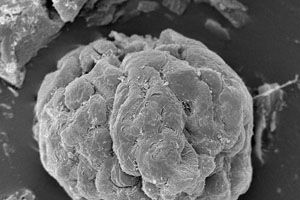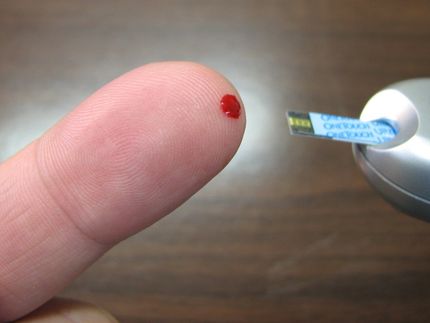When sugar damages kidneys
New hope for diabetes patients with kidney disease
diabetes mellitus is one of the most common secondary diseases in modern society. And because it is on the rise, it is also one of the greatest challenges facing medicine today. Diabetes patients do not die as a direct result of the increase in blood sugar, but from the long-term complications of their disease, in which the increase in blood sugar causes damage to blood vessels and organs. Kidneys are particularly susceptible to damage, and this can lead to a loss in kidney function and the need to begin a dialysis treatment.

The complex structure of the kidney filter (magnified here 4000 times) is especially susceptible to secondary complications of diabetes.
Björn Hartleben and Martin Helmstädter
Prof. Dr. Tobias Huber is a kidney expert in the Nephrology Division of the University Medical Center Freiburg. With the support of the Cluster of Excellence BIOSS – Centre for Biological Signalling Studies, Dr. Huber and his team were able to identify a signalling path that affects the progression of kidney disease in diabetes patients: mTOR is an important metabolic enzyme that controls similar functions in simple organisms, such as yeast and roundworms, as in humans; for example, it controls the growth and reproduction of cells. Diabetes causes the mTOR signalling path to become overactive, which can cause damage in highly specialized kidney cells.
The researchers in Freiburg were able to demonstrate that, although the basal activation of this enzyme may be important for the regular function of renal corpuscles during embryonic development, an overactive mTOR can result in a serious disruption of the kidney filter in diabetes patients and can lead to a total loss of function. In tests on animals, the deliberate genetic interception of this signalling path was able to halt the progression of kidney disease.
This result also gives us hope that it will be possible to prevent kidney disease in diabetes patients in the future.
Dr. Huber was also honoured last year with the highest scientific award in Germany for kidney research, the Franz Volhard Award, for his achievements in the field of kidney filtration.
Original publication
Other news from the department science

Get the life science industry in your inbox
By submitting this form you agree that LUMITOS AG will send you the newsletter(s) selected above by email. Your data will not be passed on to third parties. Your data will be stored and processed in accordance with our data protection regulations. LUMITOS may contact you by email for the purpose of advertising or market and opinion surveys. You can revoke your consent at any time without giving reasons to LUMITOS AG, Ernst-Augustin-Str. 2, 12489 Berlin, Germany or by e-mail at revoke@lumitos.com with effect for the future. In addition, each email contains a link to unsubscribe from the corresponding newsletter.

















































